It was medicine that chiefly interested Nicholas Ferrar, than whom no traveller for study’s sake was ever more devoted to the task of self-improvement. At about the same time that the second Earl of Chesterfield was fighting duels at the academy of Monsieur de Veau, Nicholas Ferrar, a grave boy, came from Cambridge to Leipsic and “set himself laboriously to study the originals of the city, the nature of the government, the humors and inclinations of the people.” Finding the university too distracting, he retired to a neighbouring village to read the choicest writers on German affairs. He served an apprenticeship of a fortnight at every German trade. He could maintain a dialogue with an architect in his own phrases; he could talk with mariners in their sea terms. Removing to Padua, he attained in a very short time a marvellous proficiency in physic, while his conversation and his charm ennobled the evil students of Padua.[300]
* * * * *
CHAPTER VI
THE GRAND TOUR
After the Restoration the idea of polishing one’s parts by foreign travel received fresh impetus. The friends of Charles the Second, having spent so much of their time abroad, naturally brought back to England a renewed infusion of continental ideals. France was more than ever the arbiter for the “gentry and civiller sort of mankind.” Travellers such as Evelyn, who deplored the English gentry’s “solitary and unactive lives in the country,” the “haughty and boorish Englishman,” and the “constrained address of our sullen Nation,"[301] made an impression. It was generally acknowledged that comity and affability had to be fetched from beyond the Seas, for the “meer Englishman” was defective in those qualities. He was “rough in address, not easily acquainted, and blunt even when he obliged."[302]
Even wise and honest Englishmen began to be ashamed of their manners and felt they must try to be not quite so English. “Put on a decent boldness,” writes Sir Thomas Browne constantly to his son in France. “Shun pudor rusticus.” “Practise an handsome garb and civil boldness which he that learneth not in France, travaileth in vain."[303]
But there was this difference in travel to complete the gentleman during the reign of Charles the Second: that Italy and Germany were again safe and thrown open to travellers, so that Holland, Germany, Italy, and France made a magnificent round of sights; namely, the Grand Tour. It was still usual to spend some time in Paris learning exercises and accomplishments at an academy, but a large proportion of effort went to driving by post-chaise through the principal towns of Europe. Since it was a great deal easier to go sight-seeing than to study governments, write “relations,” or even to manage “The Great Horse,” the Grand Tour, as a form of education, gained upon society, especially at the end of the century, when even the




